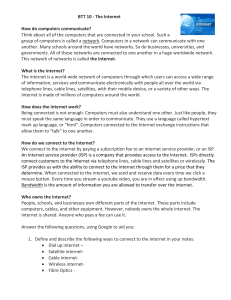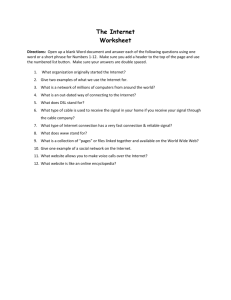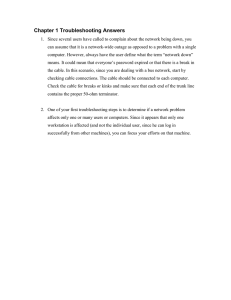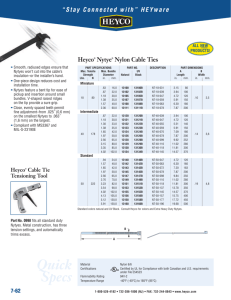IXP AND CACHING WARRANTS REVIEW OF BROADBAND SUPPLY Overview of Broadband
advertisement
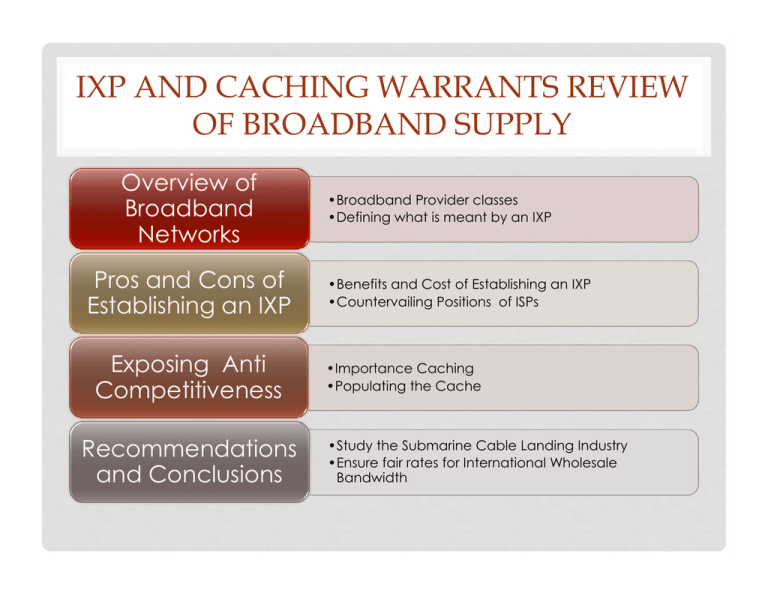
IXP AND CACHING WARRANTS REVIEW OF BROADBAND SUPPLY Overview of Broadband Networks Pros and Cons of Establishing an IXP Exposing Anti Competitiveness Recommendations and Conclusions •Broadband Provider classes •Defining what is meant by an IXP •Benefits and Cost of Establishing an IXP •Countervailing Positions of ISPs •Importance Caching •Populating the Cache •Study the Submarine Cable Landing Industry •Ensure fair rates for International Wholesale Bandwidth BROADBAND PROVIDER CLASSES • Two Classes of ISPs • Submarine Cable • Non-submarine Cable ECFS WiFi ISP DSL ISP Internet IRU Cable ISP IRU Submarine Cable Landing Cable ISP DIFFICULTY IN OBTAINING DATA Submarine Cable Operators • • • • Price of service? Customer Bandwidth? Total Revenues Earned? Actual Capacity used? • Customers are other telcos • Reciprocal Agreements exists • Capacity into and out of Dominica • >9 Gbps cumulatively • Traffic < 2 Gbps • Typically Responses • This information is confidential and highly Sensitive • Confidentiality covenants exists with subscribers NTRC IXP ESTABLISHED Cost/Cons • Capital Outlay US $15K • Monthly cost < US 2K • Potential Revenue Loss for submarine cable ISP • Time ~ 2 Years DANIX Very Small 200 Mbps Peak 5 Members AMS-IX Among Largest 1.1 Terabytes of traffic peak > 300 Members worldwide Benefits/Pros • Global Partnerships • • • Google Global Cache AKAMAI Cache DNS Root Server mirror • Local content on Major ISP only • Efficient Routing of Local traffic • Entrepreneurs have a local point of connection to all ISPs • Reduction in Anti-competitive practices • Savings on International Wholesale Connectivity • Manifestation of ISP Countervailing positions • Increased Transparency on International Bandwidth Prices Resellers of International bandwidth IXP results in potential revenue loss International Bandwidth is affordable Caching already implemented regionally Consumers of International bandwidth IXP saves costs International bandwidth is expensive Global Partnerships for Caching realized Non-Submarine Cable ISP Submarine Cable ISP COUNTERVAILING POSITIONS ON IXP IMPLEMENTATION IMPACT OF CACHING International cache Internet Local Logical Topology DSL ISP Cable ISP Cable ISP POPULATING THE CACHE • Tender Issued from DANIX (IXP) to all ISPs to Populate the cache • Bids Received from two ISPs • ~ 1st Bid: 5000 USD/Month for 150 Mbps ~ $33.00/Mbps • Plus a cost of $50,000.00 USD for anyone joining the IXP • ~ 2nd Bid:13,000 USD/Month for 150 Mbps ~ $86.00/Mbps • Non-submarine ISP informed of Prices: • Pre-bid 2014: 80 Mbps ~$50,000 USD/Month ~ $277/Mbps • Post-Bid 2015: 400 Mbps ~ $60,000 USD/Month ~$150/Mbps CONCERNS • Price to non submarine cable ISPs and others is highly variable • Price charged by submarine cable ISPs to themselves is unknown • Submarine cable ISPs share peering agreements • Free/cheap redundancy • Submarine cable ISPs may be engaging in Margin Squeeze. • Submarine cable companies are not forthcoming with data • Hide behind the veil of confidentiality agreements • Submarine cable service is deemed a competitive service by ECTEL • Not subjected to regulatory price controls like the fixed line service RECOMMENDATIONS • Initiate a study into the cost of International Wholesale Connectivity • Fair Pricing • Collusion • Margin Squeeze • Implement rate publishing measures of the Retail Tariff Regulations on Submarine Cable Operators • Initiate the breaking up of vertically integrated Submarine Cable Landing Operations and Internet Service Providers. CONCLUSION • IXP is not equally beneficial to the submarine cable ISP and the non-submarine cable ISP. • Bids received for populating of the cache revealed potential anti competitive practices • Further studies and implementation of stricter measures on Submarine Cable Operators. QUESTIONS OR COMMENTS Craig Nesty Executive Director NTRC Dominica Email: cnesty@ectel.int Mobile: 1(767)235 1245 Office: 1(767)440 0627
